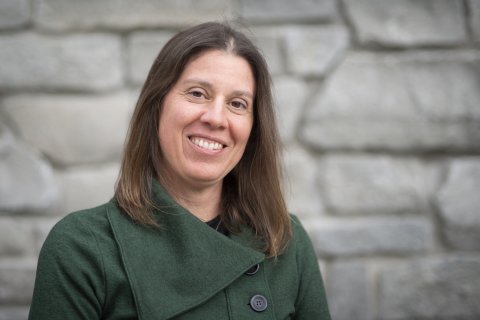Sara E. Scanga, Ph.D.

Jump To
Biography
Professor of Biology Sara Scanga joined the Utica University faculty in 2010. She was an EPA STAR and NSF GK-12 graduate fellow at SUNY College of Environmental Science and Forestry, where she received her Ph.D. in Ecology in 2009. Prior to entering graduate school, she worked as a research technician at both the NYS Department of Health’s Wadsworth Center and the Cary Institute of Ecosystem Studies. She was the 2021 recipient of the Harold T. Clark, Jr. Award for Distinguished Scholarship and Professional Accomplishment at Utica University.
Education
- Ph.D. in Ecology - SUNY College of Environmental Science and Forestry
- B.A. in Biology - Drew University
Research
Dr. Scanga is a plant ecologist who has a wide range of interests at multiple scales of inquiry. She frequently engages in applied and interdisciplinary research with scientists at all career stages and in many different fields of study. She welcomes motivated undergraduate students to join her in plant-focused research work that may include summer outdoor fieldwork, greenhouse experiments, and data analysis using spreadsheets, statistical software, and GIS. More information about Dr. Scanga’s research with students can be found here. Dr. Scanga is also interested in identifying teaching strategies that engage students in learning both macroscale ecological concepts and dataset analysis skills. She is currently a co-PI on three grants awarded by the National Science Foundation with funding totaling $1.2 million.
Current Grants
- RCN: The Macrosystems Ecology for All (MEFA) Research Coordination Network. National Science Foundation award #2213541
- Pathways to achieving STEM success: Scholarships, mentoring, and development of STEM identify to support undergraduate STEM degree completion. National Science Foundation S-STEM award #2030447
- Integrating networked large datasets into undergraduate teaching and research through a collaborative workshop with EREN, NEON and Project EDDIE. National Science Foundation award #2005443
Selected Publications
*undergraduate student coauthor
- Rodgers, V., S. E. Scanga, J. St. Juliana, E. Tietjen, J. Honea, L. Byrne, Z. Leggett, and G. Middendorf. 2024. Four-Dimensional Ecology Education (4DEE) for everyone: teaching ecology to non-majors. Frontiers in Ecology and the Environment (online first). link
- Rodgers, V. L. and S. E. Scanga [co-lead authors], M. B. Kolozsvary, D. E. Garneau, J. S. Kilgore, L. J. Anderson, K. N. Hopfensperger, A. G. Aguilera, R. A. Urban, and K. J. Juneau. 2022. Where is garlic mustard? Understanding the ecological context for invasions of Alliaria petiolata. Bioscience 72(6):521-537. link
- Styers, D. M., J. L. Schafer, M. B. Kolozsvary, K. M. Brubaker, S. E. Scanga, L. J. Anderson, J. J. Mitchell, and D. Barnett. 2021. Developing a flexible learning activity on biodiversity and spatial scale concepts using open-access vegetation datasets from the National Ecological Observatory Network. Ecology and Evolution 11:3660-3671. link
- Lawrence, G. B., S. E. Scanga, and R. D. Sabo. 2020. Recovery of soils from acidic deposition may exacerbate nitrogen export from forested watersheds. Journal of Geophysical Research: Biogeosciences 125(1):1-18. link
- Scanga S. E., B. Hasanspahič*, E. Zvorničanin*, J. Samardžić Koženjić*, A. K. Rahme*, and J. H. Shinn-Thomas. 2018. Erythritol, at insecticidal doses, has harmful effects on two common agricultural crop plants. PLOS ONE 13(4):e0192749. link
- Scanga, S. E. 2014. Plant demography in wetland canopy gaps: nonlinear and indirect responses. Plant Ecology 215:927-935. link
- Scanga, S. E. and D. J. Leopold. 2012. Managing wetland plant populations: lessons learned in Europe may apply to North American fens. Biological Conservation 148:69-78. link
Courses Taught
- BIO 111 Nature and Humans
- BIO 211 General Biology I
- BIO 232 Research Methods II
- BIO 323 Ecology
- BIO 325 Botany
- BIO 400 Contemporary Biological Research
- BIO 420 Short Course in Biology
- BIO 438 Conservation Biology
- BIO 450 Senior Research in Biology
- BIO 495 Senior Seminar
- NTR 434 Sustainable Food Systems
Other Information
I would like to see logins and resources for:
For a general list of frequently used logins, you can also visit our logins page.
